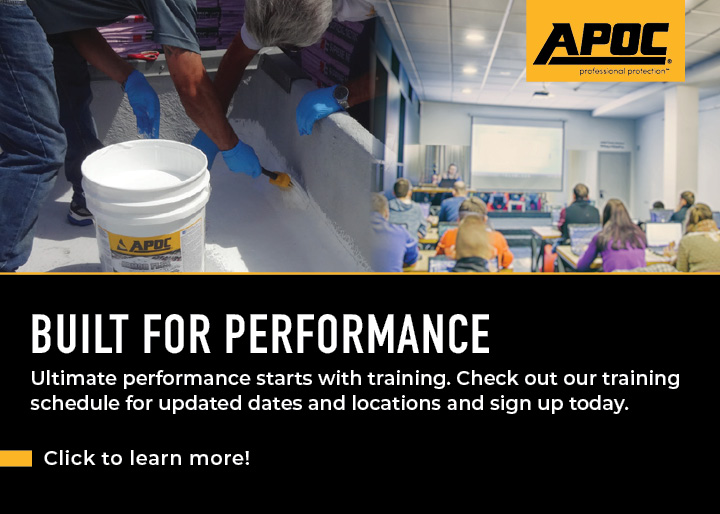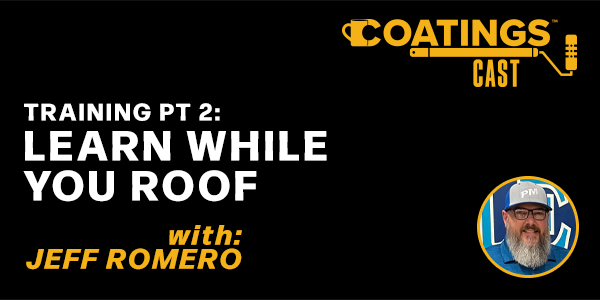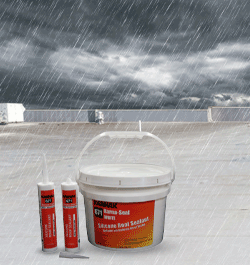UP TO THE MINUTE
Training Pt 2: Learn while you Roof - PODCAST TRANSCRIPT
July 15, 2025 at 2:00 p.m.Editor's note: The following is the transcript of a live interview with Jeff Romero from Progressive Materials. You can read the interview below, listen to the podcast or watch the recording.
Intro: Welcome to CoatingsCast, the ultimate podcast dedicated to the science, art and innovation of liquid and fluid-applied roofing, coatings for surfaces and waterproofing. It's time to roll up our sleeves, put on our lab coats and dive headfirst into the world of liquid protection that keeps your roofs and surfaces in prime condition. The future is here and it's liquid, so don't miss out. This is CoatingsCast, where every drop counts in the world of roof and service protection.
Hello, everyone. My name is Megan Ellsworth here at CoatingsCoffeeshop.com and you are listening to a CoatingsCast. And this is part two in a three-part episode series that we're doing here with Progressive Materials with Jeff. Hello, how are you?
Jeff Romero: I'm doing well, Ms. Megan, how are you?
Megan Ellsworth: I'm so good. I'm excited to continue our conversation from the previous episode. And this one is a little bit more about all the support you all provide to your contractors. So before we dive in, I'll just have you introduce yourself and tell us a little bit about Progressive Materials.
Jeff Romero: So my name is Jeff Romero. I am the Technical and Education Coordinator for PM. Progressive Materials is a manufacturer of a full line of silicone and acrylic roofing systems. We've been doing it since about 2011, I believe. And yeah, we're here for our contractors. We love to support them.
Megan Ellsworth: Love it. So let's set the stage here. Why is the relationship between contractors and manufacturers so important in the roof coatings industry specifically?
Jeff Romero: So the biggest thing, we've already kind of covered that, but there's a little more to it when we get into the support side of things, the pricing and the answering questions and all that is great.
The thing that really comes to mind is the contractor really needs to be confident that when they go and install or apply a manufacturer's roof system, that they're going to have the support that they need when they need it. A lot of times the support is there, but it's kind of after the fact, right? That's not how we look at things here at PM. We really want to be supportive before the job, during the job and after the job, if anything, God forbid, goes awry.
On the flip side of that, the manufacturer also has to have confidence that the contractor that they're working with is going to hold the standard that that manufacturer has for themselves and for their products and for the service that they provide. So it's kind of a twofold, it's a give and take kind of thing. We really want to work with contractors that are going to hold our standard and contractors really want to work with manufacturers that are going to support them and be there when they need them. So that's really one of the bigger reasons why that relationship is so important.
Megan Ellsworth: Yeah, it's so important and like you said, be there when they need them, not just when it's convenient for the manufacturer or vice versa. So I love that, that support every step of the way.
Jeff Romero: Yep.
Megan Ellsworth: So how does Progressive Materials, PM, assist new CLA applicants, appliers, CLAs who are just getting started with coatings?
Jeff Romero: So whenever we find a CLA who hasn't or a contractor that wants to become a CLA who doesn't have any or a lot of experience with coatings, the CLA training is really designed at an elementary level. It really is an introductory level for anybody. Contractors who have been doing coatings for years can benefit from it, as well as contractors who are new to coatings.
We go through not only our products and our process, which is important obviously for us, but we also go through general best practices and things that you should do in coating, whether you're using PM or not. There's a lot of things that a lot of manufacturers maybe don't require that we do. We explain in detail why we require those things and why it's important to do it for the success of a job, whether you're using PM or not.
So that's one thing that we really do to help our new CLAs, our guys, well, any new CLA really, whether they're experience with coatings or not, we're willing and we make a great effort, we'll go and walk jobs with them to help them look for those key points that qualify or disqualify a job for coating. We go through during the training a lot of how do we address, okay, this issue is on the roof and it's not coatable, but it's just in a small isolated area of the roof. Well, how do we address that? We cover all of that in the training. We'll reinforce it with job walks after the fact, after the training. We help those guys along.
Megan Ellsworth: Amazing. Amazing. Amazing. Okay, so let's keep going with that. What other support does PM offer throughout the roofing process, pre-job, during the job, post-job?
Jeff Romero: So pre-job, like I just said, we'll come out and do walks with you on jobs. A lot of times those things kind of fall in your lap as a contractor, so it's last minute. So we can't schedule to get out to you. You call us up on FaceTime, we can walk the roof with you that way. I do those all the time.
Megan Ellsworth: I love it.
Jeff Romero: We'll help you qualify it. Our regional managers are great at helping estimate amounts of materials you might need, helping you with pricing, helping you with just different aspects of what you should be charging for labor, whatever that might be. We really help a lot with that process.
Megan Ellsworth: That's great.
Jeff Romero: Qualifying the roofs. Then during the job, a lot of times we'll have guys say, "Look, I have this really big job," and what's funny is a really big job to one contractor could be a really small job to another, so it's really perspective. The new guy who's just getting into coating, he lands a 100 square job, that's massive. There's other contractors that are like, "A little 100, we do those all day long."
So regardless of your perspective, if it's big to you, it's big to us. We landed this job. We're really kind of, we're confident, but we're a little nervous. It's our first one. One of us from the technical team, the regional managers will go during the job. I've spent three days in a city just to go and be on a job with a contractor for those three days. Just kind of pointing out little things and little tips that we can help you with along the way.
So we're absolutely willing to do that. Again, those types of things kind of need to be scheduled ahead of time with us so we can make sure that we're there. But if it's not and you run into something on a job, the FaceTime, I do a lot of FaceTime. It's a great, great tool.
Megan Ellsworth: It is.
Jeff Romero: It's wonderful. So give me a shout. A lot of guys will just snap pictures and text them over to me, "Hey Jeff, this is what I'm dealing with. What do you think we should do here? Or what am I looking at?" Kind of a thing.
And sometimes I don't have the answer, so I'll text it over to my boss or one of the other guys in the department and say, "What do you think, guys?" And we'll have a discussion about it and come to a consensus and then we send that information over to the contractor. A lot of times we'll get on a conference call with the contractor. "This is-"
Megan Ellsworth: I love it.
Jeff Romero: "This is what we're kind of thinking, you're on the roof. Do you agree with what we're thinking, based on the picture?" That kind of thing. We do a lot of that kind of stuff.
And then post-job, post-job obviously is the most important. We want to make sure that the finished product is to our standard, to our contractor standard and all that stuff. And unfortunately, it's just an unavoidable evil in the industry. We have jobs that just don't go our way sometimes and there's issues after the fact.
If that is the case, obviously if it's under warranty, it's our responsibility. But we always go back to the contractor that installed the job and say, "Hey, look, we have this issue. Here is a scope of work." We will go and walk that roof and really dive into what's going on, try to figure out why it happened and more importantly, how do we get to the other side of it? How do we fix it?
We'll come up with a complete scope of work, provide that to the contractor and say, "Here is what we think." And a lot of times the contractor's like, "Well, man, I was kind of thinking we could do this." And we're always willing to have those conversations. We're rarely going to say, "This is the way it's got to be done, no questions asked. Go and do it." If the contractor has some input, we take that into account and sometimes we're like, 'Yeah, that's a damn good idea. Let's incorporate that into the scope that we came up with and get to the other side of this thing."
Megan Ellsworth: Yeah. Yeah, that's great to know too, in the face of a warranty issue or building owner not being happy with the end result, that you all will be supportive of your contractors through thick and thin.
Jeff Romero: So our contractors, our CLAs that are able to offer our warranties, they actually own that warranty, the labor side of that warranty for the first 30 months, which is pretty typical in the industry. It's usually 24 to 30 months.
So in that time period, they're [inaudible 00:09:43] for any issues or warranty issues that come up on that roof. We'll provide the material. And if that issue comes up, we're not just going to say, "Tell us how many buckets you need and go and fix it." We're going to get involved.
Now, if it's something easy, contractor sends us a picture, "Hey, it's A, B and C. I'm going to go do X, Y and Z." We're, "Yeah, go for it." But sometimes things can get a little confusing and complicated on what's going on the roof. So that's when we will come and visit the roof with you and really kind of put our heads together and figure out what we need to do.
And then obviously any warranty job is inspected by one of our inspectors. Again, all of those guys are PM employees.
Megan Ellsworth: Amazing.
Jeff Romero: They're in-house, so those guys will be out there on the roof. And a lot of times the inspectors will see things on those jobs that could potentially end up being a bigger issue and we can nip those things in the bud with our inspectors.
Megan Ellsworth: Yeah, that's great. That's great. Can you walk us through how PM helps contractors during the estimating and bidding process?
Jeff Romero: Right. So that's not really something that my department specifically does. We'll help with amounts, "Hey, how do I figure out how much flashing grade I need for curbs or penetrations?" Our regional managers, I don't want to sound like we don't do that, but our regional managers are very involved in that process with a lot of the contractors. So they're the ones that are really going to be involved in that process with your contractor or as involved as the contractor wants them to be, right?
Megan Ellsworth: Got it.
Jeff Romero: As far as my department and what we do, we have a little formula for a two-gallon bucket of flashing grade, for instance or our acrylic mastic that kind of breaks things down into linear feet. So that way you can go and say, "Okay, I have X amount of penetrations on the roof. I have X amount of linear feet of curb that I have to flash in." That little formula can really start to, "Okay, that makes sense. This is how much I'm going to need."
And honestly, any question that comes up during that process where our RMs are great, the regional managers are great, they'll take the time to really break things down with you. We work with contractors all around the country. Things are different regionally in different markets. So we can give you input on this is how much, generally speaking, waste percentage people are adding to these jobs. Our coverage guide online breaks down all the different substrates that could be coated and it breaks down all the different warranty terms available. It gives-
Megan Ellsworth: That's awesome.
Jeff Romero: Yeah, it's a great tool for the estimators. And the applicators, honestly. So it'll give you your wet and dry mills for that substrate for that warranty term. It gives you gallons per square. It'll give you how many square feet per five gallon bucket and then it gives you what we call marking squares, which is what you use to grid the roof off to apply. And we go into that in detail in the CLA training.
But the most important thing for what we're talking about here is the gallons per square. So you know exactly how many gallons per square you will need for that warranty term for that type of roof. So you can go to that, do the math and then tack on whatever percentage of waste that you choose to add. So there's a lot of tools and a lot of support in that bidding and estimating process.
Megan Ellsworth: That's great. That's fabulous. Okay. And then Jeff, I'm hearing a little bit of the crackling.
Jeff Romero: Okay. Okay. Is that better?
Megan Ellsworth: And I know you wanted me to tell you.
Jeff Romero: Yeah, no, I appreciate it. No, yes. I don't want to be the shmuck again. Is that better? I want to kind of stick my neck out a little bit, so [inaudible 00:13:35] on me.
Megan Ellsworth: Oh, perfect. I don't hear it now.
Jeff Romero: Okay, cool.
Megan Ellsworth: It's super faint though. It kind of just sounds like someone doing Morse code, like really faintly in the background.
Jeff Romero: It might also be my beard rubbing on it. I don't know.
Megan Ellsworth: I don't know. Well-
Jeff Romero: Or maybe my neck.
Megan Ellsworth: ... I can't hear it now.
Jeff Romero: Okay, cool.
Megan Ellsworth: Okay. Yeah, no, you all have so many offerings and I think that's so fabulous. And I love how you were talking about how that guide can help both the estimator and the applicator. And seeing all the different warranties and what the substrates and all the info that you provide, that's fabulous.
Okay. So tell us about a time when PMs on support... Hold on, not on support. So can you tell us about a time when PM's on-site support made a big difference in a project's outcome?
Jeff Romero: Okay, so we had a big job in Georgia. It was about 2 million square feet. The contractor didn't know if this particular substrate or roof system was going to be coatable had some issues going on. But you don't want to be the only contractor saying, "Hey, we can't coat this roof," when other contractors are saying, "Yeah, we'll just coat it, no problem." And then it becomes a big issue later on, but that doesn't help us in the immediate. It kind of sucks.
So our regional manager, one of our inspectors and actually my boss, our tech services director, Jay, they went out there, they spent, I think two days walking this roof, going over it with a fine-tooth comb. Every little issue that they saw, they were like, "Okay, here's what we can do here." They took notes and they took measurements to know where all those little issues were and walked it with the contractor. So he could go and bid that job with confidence knowing that any issue that was on that roof, he knew exactly where it was, he knew exactly how to address it per our input. And ultimately, he went and presented this job, landed the job and we did the job. Like I said, it was two buildings, big manufacturing facility in Georgia, about 2 million square feet.
So that was big for the contractor. I don't care what size contractor you are. You can be the biggest guy or the littlest guy. That's a great job, that's a big-
Megan Ellsworth: Yeah.
Jeff Romero: So that's the one that pops up in my head. And honestly, Megan, that kind of thing happens every day with us. There's always, "Hey, man, I don't think this is coatable. What do you think?" And a lot of times they'll send me pictures or we'll FaceTime and I'll say, "Nope, you're right. It's not coatable, walk away or replace it." But oftentimes, I'm like, "No, man, we can just do this or that," or, "Here's your solution for this little issue." Or, "We can cut that out and replace it and we're good to go." So it literally happens on a daily basis.
Megan Ellsworth: That's awesome.
Jeff Romero: Those types of scenarios.
Megan Ellsworth: It's almost like they have a little encyclopedia in their pocket.
Jeff Romero: Sure. Sure.
Megan Ellsworth: And that is you or your team members.
Jeff Romero: Right. Well and that's, I've never really thought of it that way, but yeah, if that's how they look at us, then we are doing what we need to do. That's our goal, is for them to go into any situation with confidence knowing that we have their back and that they can lean on us and get the answers that they need. It might not always be the answer that they want, but they'll get the answers that they need.
Megan Ellsworth: Yeah. Absolutely. Absolutely, which I love.
Jeff Romero: [inaudible 00:17:04].
Megan Ellsworth: So how does your team stay accessible to contractors in the field? We've touched on this, FaceTime, but especially during crunch times, how do they contact you?
Jeff Romero: Your regional manager is going to be your first point of contact. Those guys can usually get in touch with me, with the other trainer, with my boss, Jay. There's always somebody who they can get in touch with. We travel a lot, so if I'm on an airplane, obviously it's hard to get ahold of me or any of us. But that's usually your regional manager, those guys are very accessible. They rarely don't answer their phone. So that would be your first point of contact. And honestly, if you're in a bind and you're in a situation, I need to talk to somebody now, you can always just get on our website, call the office and they forward me and Jay, my boss, phone calls all day long.
Megan Ellsworth: Great.
Jeff Romero: So you can always get in touch with somebody. And Ms. Dawn, who is wonderful, she answers the phones. All the people in our office are great, but Ms. Dawn is very special. She knows usually kind of where we are. She knows who's available and who's not to take a call, so she'll forward it to either me or Jay. So you can always get ahold of somebody in that moment of need. That's really something that we work really hard to stay available. And if Jay or I isn't available, there's other people in the office that have tons of knowledge that she can send kind of down the list, right?
Megan Ellsworth: Yeah. Yeah, yeah. That's incredible. I just love how dedicated you are to your contractors and I think I'm sure that they appreciate it as well. So to kind of round out our convo here, how can contractors access all this great support that you provide and then use that to break into the coatings and restoration space?
Jeff Romero: Sure. So again, that kind of goes back to the themes of things. Reach out to your regional manager. Get on our website and just go poke around. Our website's a great resource, not only for existing CLAs, but for guys that want to start working with us or are interested in learning more about coatings. All of our full specs are online. Our marketing department does a great job with our blog. We have tons of videos that the marketing director and myself work very hard on. Some of those are new ones. We've been delayed a little bit, but new ones are coming out pretty soon. I'm actually going to be in Indiana at our plant next week filming some new ones.
Megan Ellsworth: Love it.
Jeff Romero: So yeah, everything, there's really no stipulation on what we provide to our contractors. If you get in touch with us and you begin that relationship with us, it's kind of like opening the floodgates, right? Everything is now available to you if you just reach out and start the conversation. We're ready when you are.
Megan Ellsworth: I love it. That is fabulous. Well, Jeff, thank you so much. Everyone can also go to the Progressive Materials directory on coatingscoffeeshop.com to learn more. We're always reposting their stuff and sharing it out so you can find it wherever we are as well. And this has been a great second part of our CoatingsCast podcast series, so thank you. And I can't wait to continue the conversation on the next one.
Jeff Romero: Yeah, great. We'll see you on the third.
Outro: Thanks for joining us on this coating adventure. Stay tuned for more episodes and in the meantime, be sure to follow us on social media to stay updated with all things roof coatings. Until next time, stay coated. For more information, go to coatingscoffeeshop.com.






















Comments
Leave a Reply
Have an account? Login to leave a comment!
Sign In